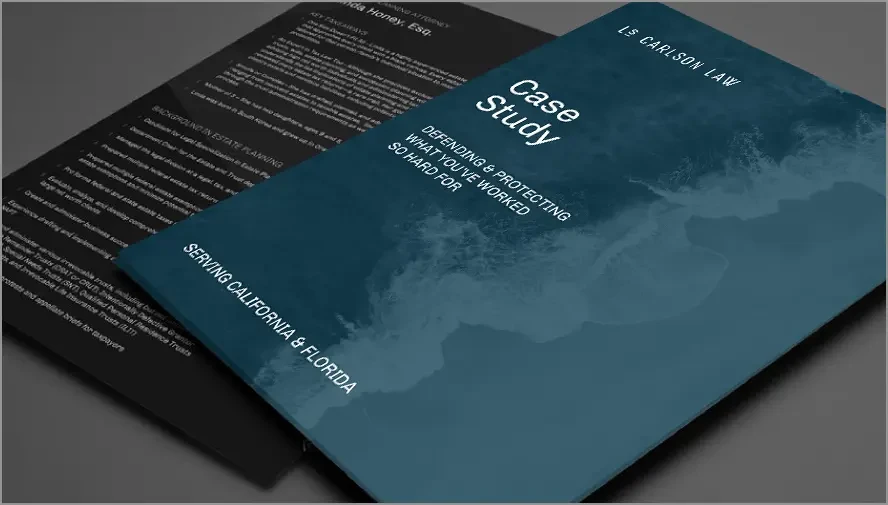AS FEATURED IN:
At LS Carlson Law, we are committed to protecting individuals from harassment, stalking, and abuse through legally enforceable restraining orders. A civil harassment restraining order attorney can help you take decisive action to safeguard your well-being.
Whether you’re seeking protection from harassment or defending against unjust claims, our attorneys provide tailored legal solutions that prioritize your rights and peace of mind.
Situations That May Require a CHRO
Harassment takes many forms, including stalking, verbal abuse, or threats of physical harm. LS Carlson Law handles cases involving:
- Repeated harassment via calls, texts, or online messages.
- Credible threats of violence that cause substantial emotional distress.
- In-person stalking or intimidation.
Our civil harassment restraining order attorneys provide the guidance and representation needed to address these situations effectively.
Navigate Complex Legal Issues with Compassion and Dedication
At LS Carlson Law, we understand that dealing with harassment can be emotionally draining. Our civil harassment restraining order attorneys approach each case with compassion and dedication.
We prioritize creating a supportive environment for clients as we guide them through the legal process. With our extensive experience in handling civil harassment cases, we ensure that your rights are protected and that you receive the relief you need.
The CHRO Legal Process
Navigating the restraining order process can be complex, requiring meticulous preparation and adherence to legal protocols.
LS Carlson Law ensures that every step is handled with precision. Our process includes:
1. Case Evaluation: Reviewing the facts and gathering evidence to build a strong case.
2. Filing for a Temporary Restraining Order (TRO): Drafting and submitting the necessary legal documents to secure immediate protection.
3. Hearing Representation: Advocating for you during court proceedings to obtain a permanent restraining order or defend against false claims.
By partnering with a civil harassment restraining order attorney, you can navigate this process with confidence and clarity.
Why Choose LS Carlson Law?
At LS Carlson Law, we provide more than just legal representation; we offer unwavering support during challenging times. Our civil harassment restraining order attorneys deliver:
- Comprehensive Legal Strategies: Tailored approaches that address the unique aspects of your case.
- Clear Communication: Keeping you informed every step of the way.
- Effective Advocacy: Protecting your rights and ensuring compliance with California law.
Defend Against Unjust Restraining Orders
In addition to helping clients seek protection, LS Carlson Law is equipped to defend individuals who face unjust civil harassment restraining orders. False or unnecessary restraining orders can have serious repercussions, impacting personal, professional, and social aspects of life.
Our civil harassment restraining order attorneys work tirelessly to challenge unwarranted claims, gather evidence, and present a strong defense in court. With our guidance, you can protect your reputation and prevent unjust consequences.
Protect Your Rights in All Stages of the Process
From initial consultations to final hearings, LS Carlson Law provides comprehensive support at every stage of the civil harassment restraining order process.
Our experienced attorneys handle the following aspects:
- Initial Consultation: Discussing your situation in detail to determine the best course of action.
- Document Preparation: Ensuring all necessary paperwork is complete and accurate for filing.
- Hearing Preparation and Representation: Building a persuasive case and representing you effectively during court hearings.
- Post-Hearing Support: Assisting with any follow-up actions or adjustments to restraining orders.
With LS Carlson Law, you can navigate the process with confidence, knowing that every aspect is handled with precision.
Address Long-Term Impact and Compliance
Receiving a civil harassment restraining order or being subject to one can have long-term effects. At LS Carlson Law, we provide clients with legal advice to understand and comply with court orders.
Whether you need help navigating the compliance requirements or want to modify an existing order, our civil harassment restraining order attorneys are here to support you. We work to ensure that you fully understand your rights and obligations and assist with any modifications or extensions as necessary.
HELP PUT A STOP TO HARASSMENT, STALKING, ABUSE & THREATS
In California, a person can seek a Civil Harassment Restraining Order (“CHRO”) to prohibit a person from engaging in harassing, abusing, stalking, or threatening conduct to him or her. CHRO’s are intended to protect a person from harm and threats of harm from someone else. When properly brought before a Court, a permanent order can remain in place for a period of up to five years and can prohibit the restrained person from engaging in a wide variety of harassing conduct. Violating the terms of a CHRO is a crime governed by Penal Code 273.6 and can lead to misdemeanor charges in most cases. A violation of Penal Code 273.6 is punishable by up to one year in county jail and/or a fine of up to $1,000.00.
CHRO’s are often compared to domestic violence restraining orders (“DVRO”), but the difference between a CHRO and DVRO concerns “who” the order is sought against. A DVRO is intended to protect a person from another where a close relationship exists (e.g., spouse, member of household, etc.). A CHRO, on the other hand, can be sought against a neighbor or even a roommate. CHRO’s also differ from the other types of restraining orders in California, including elder abuse restraining orders (“EARO”) and Workplace Violence Restraining Orders (“WVRO”).
Civil harassment is conduct that is prohibited by statute as defined in Code of Civil Procedure Section 527.6. “Harassment” generally includes unlawful violence (such as assault, battery, or stalking), a credible threat of violence, and/or conduct that is annoying or harassing that serves no legitimate purpose. Harassing conduct can include telephone calls, email, or social media messages, and must be directed at the protected party by someone who is not in a “close relationship.” This means that a CHRO cannot be obtained against a spouse, ex-spouse, domestic partner, and/or cohabitant. The harassing conduct must also cause substantial emotional distress.
In order to obtain a CHRO, the protected person must complete the necessary restraining order forms (CH-100) and file them with the Court. A Judge will then decide whether or not to issue a Temporary Restraining Order (“TRO”) within one business day. A TRO is generally granted where there is a risk of physical harm to the protected party. The clerk of the Court will then set a date for hearing where the protected party will present its evidence in support of permanent orders. If a TRO is granted, it will last until the Court date set by the Clerk.
The protected party must then serve the offending party with a copy of the appropriate restraining order papers in advance of the hearing date. This means that someone who is not involved with the matter who is at least 18 years old must hand-deliver a copy of all the papers to the restrained person.
At the hearing a Judge will hear the evidence presented by both parties and will decide whether to continue the TRO or make a “permanent” restraining order (also referred to as an Order After Hearing) that can last up to five years.
Following a hearing on a CHRO, a Judge may restrain a wide variety of conduct in order to sufficiently protect a person from further harassment. This may include limitations on the places where a restrained person may go, the activities that a restrained person may engage in, and/or the times that the restrained person may do each. The restrained person may also be ordered not to contact the protected party (including no phone calls, emails, or social media messages).
Following the granting of a personal conduct order, a restrained person must turn in all guns and may not possess or purchase a gun while the restraining order is in effect.
Where an incident of severe harassment or violent conduct is at issue, the Court can also issue a criminal protective order or “stay-away” order. These matters may be referred to the district attorney who may elect to file criminal charges against the offending party.
In order to obtain a CHRO, the protected party must prove by clear and convincing evidence that the harmful conduct has occurred, and that the protected party has suffered substantial emotional distress. Clear and convincing evidence is the highest evidentiary burden in a civil matter and requires a showing that there is a “high probability” that a fact is true and requires that the evidence “leave no substantial doubt” as opposed to something simply being more likely than not. Although there is no California statute that defines what is “clear and convincing,” case law makes clear that the evidence presented must demonstrate more than a “he said, she said” scenario. Often clear and convincing evidence can be demonstrated by video, audio, and/or photographic evidence, although such evidence is not required.
A violation of a CHRO is a crime pursuant to California Penal Code 273.6. In most cases, the violation of a CHRO may be charged as a misdemeanor, punishable by up to one year in county jail or a maximum fine of $1,000.00. A CHRO that is repeatedly violated, however, can result in the offender being charged with a felony which is punishable by up to three years in county jail and/or a fine of up to $10,000.00.
While an attorney is not required either to seek or defend against the imposition of a CHRO, legal representation is recommended. While parties are free to represent themselves in CHRO proceedings, the consequences of failing to obtain a CHRO or failing to properly defend against a CHRO may be dire. For example, an unrepresented party who fails to obtain a CHRO against a party who has legal representation may be ordered to pay the opposition’s legal costs. A prevailing party in a CHRO proceeding may be entitled to recovery of attorneys’ fees and costs at the discretion of the Court.
Further, failing to defend against a CHRO may result in catastrophic consequences. The imposition of a CHRO is a fact that must be disclosed in many employment applications and may result in a change in immigration status. The issuance of a CHRO may also result in prohibitive personal conduct orders, but will also result in the inclusion of the offending party in the California Law Enforcement Telecommunications System “CLETS.” The CLETS system is a computer network that gives police departments access to national databases maintained by the State and Federal Government.
A Professional Strike Force for Your Legal Matters
LS Carlson Law is comprised of battle-tested, highly skilled lawyers who operate with a single objective – to win. We prioritize efficiency and innovative strategies, and in doing so, have waged war on the “old way of doing things.”

Partner

Partner

Partner

Partner

Partner

Partner

Partner

Partner

Senior Associate

Senior Associate

Senior Associate

Senior Associate

Senior Associate

Senior Associate

Senior Associate

Senior Associate

Senior Associate

Senior Associate

Senior Associate

Senior Associate

Senior Associate

Associate

Associate

Associate

Associate

Associate

Associate

Associate

Associate

Associate

Associate

Associate

Paralegal

Accounts Receivable

Executive Analyst

File Clerk

Administrative Assistant

Senior Paralegal

Accounts Receivable Assistant

Administrative Assistant

Client Services Specialist

Paralegal

Client Services Specialist

Director of Administration

Client Services Specialist

Paralegal/Administrative Assistant

Administrative Assistant

Talent & Culture Coordinator

Legal Assistant

Administration Assistant

Director of Client Services

Paralegal

Director of Billing Services

Client Services Specialist

Legal Assistant

Client Activation Coordinator/Assistant Case Manager

Accounts Receivable

Take Control with LS Carlson Law
Your safety and rights are paramount. At LS Carlson Law, our civil harassment restraining order attorneys are ready to take action to protect you or defend against false allegations.
Schedule a consultation with our trusted civil harassment restraining order attorney and receive the legal support you need to achieve peace and security. Let us handle the legal complexities while you focus on restoring your well-being.







